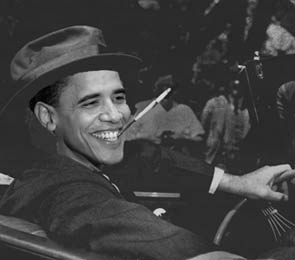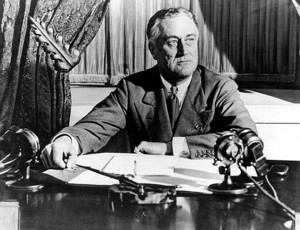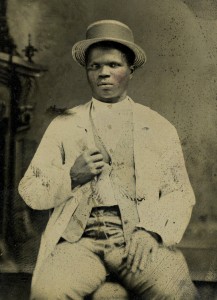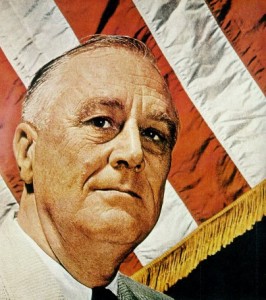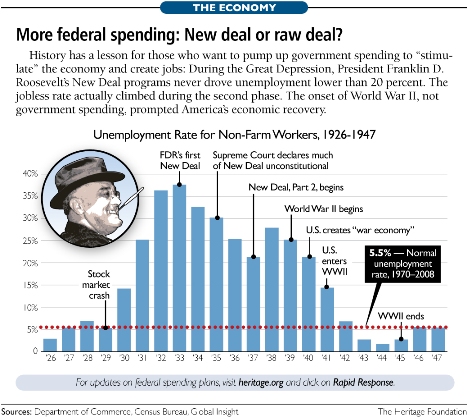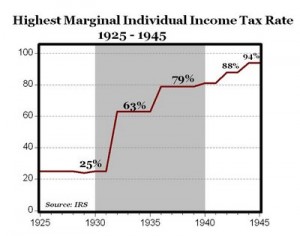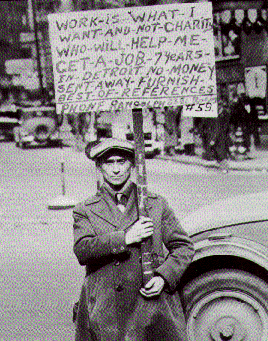 I have to admit that I have on occasion caught parts of the Glenn Beck show; you know that far Right-Wing fear and hate monger. Mainly I catch it on the weekends, if at all. Anyway, Beck for well over a year has been preaching about the coming economic apocalypse. However frightening and interesting it is to listen to him drone on and on, I remained skeptical of his apparent delusions of grandeur. We’re too big to fail, the economic make up of our country today is so vastly different than it was in the late 1920s and early 1930s, right?
I have to admit that I have on occasion caught parts of the Glenn Beck show; you know that far Right-Wing fear and hate monger. Mainly I catch it on the weekends, if at all. Anyway, Beck for well over a year has been preaching about the coming economic apocalypse. However frightening and interesting it is to listen to him drone on and on, I remained skeptical of his apparent delusions of grandeur. We’re too big to fail, the economic make up of our country today is so vastly different than it was in the late 1920s and early 1930s, right?
However, as a student of history I am beginning to have some cause for concern. With the recent closed door signing of a bill by the President to increase the Federal deficit to $14.3 trillion, along with: a potential massive health care bill and the jobs bill that supposedly will create jobs (remember we already had one that was to keep us from seeing 8-9% unemployment; we are now hovering around 10%.) That’s not to mention Cap and Trade and other bills lurking in Congress. The fact that future taxation will have to become a burden for not just the wealthy but for most of us who hold jobs, has got me wondering if Mr. Beck is right?
According to the report [linked above]:
White House Office of Management and Budget projects that these changes will raise taxes on wealthy Americans by $636.7 billion over the next decade.
Spend and tax did not get America out of the Great Depression as unemployment never stabilized because the job creation initiatives by FDR failed to initiate true economic recovery (it was a government injected mirage that was never sustainable). Some argue FDR did not go far enough, did not spend enough. FDR wanted to keep the deficit somewhat under control. How did he achieve this? Taxes, especially on the wealthy and small business (those that survived). It’s the private sector, the small businesses that will create long term sustained job growth. However, not when they face no incentive to create jobs as their government will simply tax their profits to some extreme measures. Spending money by the government can be just fine and dandy, but when that is combined with heavy taxation, the private sector is doomed. Spend money on what you must, but cut taxes on the small businesses (and corporations) and watch them grow and grow and before you know it, you have the tax money needed because the private sector has grown, thus producing more tax revenue. Think of it this way, when Henry Ford introduced his assembly line and sought to produce more and more cars at a cheaper price in order to create more demand, he made more money. Same thing applies to taxation, create more tax payers without increasing the tax, and you make more money.
Several arguments. What got us out of the Great Depression? You could argue that the New Deal created the infrastructure that allowed the country to survive. The massive spending on war materials in the late 1930s early 40s. But mainly, and this is a point of serious debate, is the simple fact that after the war the United States was the only industrial economy left standing and this allowed the private sector to blossom and with it the complete recovery of our economy.
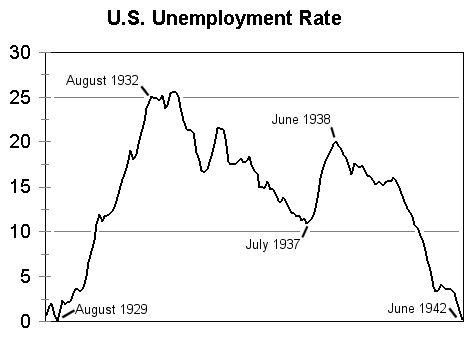 In comparison, the Great Depression did not truly become great until three years after the stock market crash of 1929. When the floor fell out of the economy (1932) is when true suffering occurred and thus produced the “great” depression. Recently, our stock market crash was 2008-09. Will we see a similar result by 2012 that we did by 1932 (per graph unemployment hits 25%)? I hope not.
In comparison, the Great Depression did not truly become great until three years after the stock market crash of 1929. When the floor fell out of the economy (1932) is when true suffering occurred and thus produced the “great” depression. Recently, our stock market crash was 2008-09. Will we see a similar result by 2012 that we did by 1932 (per graph unemployment hits 25%)? I hope not.
FDR did not listen to small business owners. Henry Ford (you know, that great capitalists mentioned above) equated FDR’s policies to communism and refused to sign into the National Recovery Administration’s policies [for more on that click here]. FDR relied on economists who were ideologues and theorists who knew little about running a business. I hope our current President is not making the same mistake?
The facts are daunting. A $14 plus trillion dollar deficit will probably doom my generation from ever enjoying the sustained prosperity of our parents. The Republicans started the spending under Bush, and now the Democrats are doing the same times ten. Meet the new bosses, same as the old bosses. It’s hard to keep a straight face when I teach American Government and Politics as a high school teacher.
We can, however, hopefully, do something for our children. That probably starts this year when we elect fiscally responsible politicians? I don’t care if these include Democrats, Libertarians, Tea Partiers, whoever, it is our most direct way to avoid a potential disaster if Glenn Beck and others are right. And I hope they are not!
UPDATE: Lone voice warns of debt threat to Fed
The US must fix its growing debt problems or risk a new financial crisis, Thomas Hoenig, president of the Federal Reserve Bank of Kansas City, warned on Tuesday, adding a mounting deficit could spur inflation.
Economists Predict Cutbacks, Tax Increases That ‘Aren’t Even Imaginable’…
American political and economic leaders have sounded the alarm for years about the red ink rising in reports on the federal government’s fiscal health.
David Muir looks into how the deficit has become so large.But now the problem of mounting national debt is worse than it ever has been before with — potentially dire consequences for taxpayers, according to a report by the nonpartisan Peterson-Pew Commission on Budget Reform.
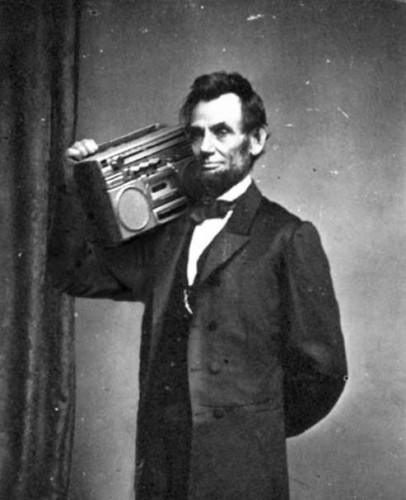 This looks like a great event, and as most of you know. I am a student at American Public Univsersity and Dr. Woodworth is current one of my instructors. Well they have a great event coming up: Discovering the Civil War Online – Live Webcast.
This looks like a great event, and as most of you know. I am a student at American Public Univsersity and Dr. Woodworth is current one of my instructors. Well they have a great event coming up: Discovering the Civil War Online – Live Webcast. 
